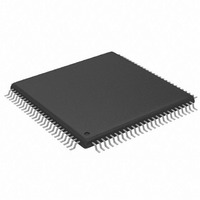PIC18F97J60-I/PF Microchip Technology, PIC18F97J60-I/PF Datasheet - Page 250

PIC18F97J60-I/PF
Manufacturer Part Number
PIC18F97J60-I/PF
Description
IC PIC MCU FLASH 65KX16 100TQFP
Manufacturer
Microchip Technology
Series
PIC® 18Fr
Datasheets
1.PIC16F616T-ISL.pdf
(8 pages)
2.PIC18F66J65-IPT.pdf
(8 pages)
3.PIC18F66J65-IPT.pdf
(480 pages)
4.PIC18F66J65-IPT.pdf
(4 pages)
5.PIC18F66J65-IPT.pdf
(10 pages)
6.PIC18F96J60-IPT.pdf
(24 pages)
7.PIC18F97J60-IPF.pdf
(472 pages)
Specifications of PIC18F97J60-I/PF
Program Memory Type
FLASH
Program Memory Size
128KB (64K x 16)
Package / Case
100-TQFP, 100-VQFP
Core Processor
PIC
Core Size
8-Bit
Speed
41.667MHz
Connectivity
EBI/EMI, Ethernet, I²C, SPI, UART/USART
Peripherals
Brown-out Detect/Reset, POR, PWM, WDT
Number Of I /o
70
Ram Size
3808 x 8
Voltage - Supply (vcc/vdd)
2 V ~ 3.6 V
Data Converters
A/D 16x10b
Oscillator Type
Internal
Operating Temperature
-40°C ~ 85°C
Processor Series
PIC18F
Core
PIC
Data Bus Width
8 bit
Data Ram Size
3808 B
Interface Type
Display Driver/Ethernet/EUSART/I2C/MSSP/SPI
Maximum Clock Frequency
41.667 MHz
Number Of Programmable I/os
70
Number Of Timers
5
Operating Supply Voltage
2.35 V to 3.6 V
Maximum Operating Temperature
+ 85 C
Mounting Style
SMD/SMT
3rd Party Development Tools
52715-96, 52716-328, 52717-734, 52712-325, EWPIC18
Development Tools By Supplier
PG164130, DV164035, DV244005, DV164005, PG164120, DV164136, DM183033
Minimum Operating Temperature
- 40 C
On-chip Adc
16-ch x 10-bit
Package
100TQFP
Device Core
PIC
Family Name
PIC18
Maximum Speed
41.667 MHz
Lead Free Status / RoHS Status
Lead free / RoHS Compliant
For Use With
AC162064 - HEADER INTFC MPLABICD2 64/80/100DM163024 - BOARD DEMO PICDEM.NET 2
Eeprom Size
-
Lead Free Status / Rohs Status
Lead free / RoHS Compliant
Available stocks
Company
Part Number
Manufacturer
Quantity
Price
Company:
Part Number:
PIC18F97J60-I/PF
Manufacturer:
MICRRCHIP
Quantity:
1 800
Company:
Part Number:
PIC18F97J60-I/PF
Manufacturer:
Microchip Technology
Quantity:
10 000
Part Number:
PIC18F97J60-I/PF
Manufacturer:
MICROCHI
Quantity:
20 000
- PIC16F616T-ISL PDF datasheet
- PIC18F66J65-IPT PDF datasheet #2
- PIC18F66J65-IPT PDF datasheet #3
- PIC18F66J65-IPT PDF datasheet #4
- PIC18F66J65-IPT PDF datasheet #5
- PIC18F96J60-IPT PDF datasheet #6
- PIC18F97J60-IPF PDF datasheet #7
- Current page: 250 of 472
- Download datasheet (8Mb)
PIC18F97J60 FAMILY
18.8.5
The Pattern Match filter selects up to 64 bytes from the
incoming packet and calculates an IP checksum of the
bytes. The checksum is then compared to the EPMCS
registers. The packet meets the Pattern Match filter cri-
teria if the calculated checksum matches the EPMCS
registers. The Pattern Match filter may be useful for
filtering packets which have expected data inside them.
To use the Pattern Match filter, the application must
program the Pattern Match offset (EPMOH:EPMOL),
all of the Pattern Match mask bytes (EPMM0:EPMM7)
and the Pattern Match Checksum register pair
(EPMCSH:EPMCSL). The Pattern Match offset should
be loaded with the offset from the beginning of the des-
tination address field to the 64-byte window which will
be used for the checksum computation. Within the
64-byte window, each individual byte can be selectively
included or excluded from the checksum computation
by setting or clearing the respective bit in the Pattern
Match mask. If a packet is received which would cause
the 64 byte window to extend past the end of the CRC,
the filter criteria will immediately not be met, even if the
corresponding mask bits are all ‘0’.
FIGURE 18-14:
DS39762B-page 248
Note:
Note:
Input Configuration:
EMPOH:EPMOL = 0006h
EPMM7:EPMM0 = 0000000000001F0Ah
EPMCSH:EPMCSL = 563Fh
Received
Data
Byte #
Bytes Used for
Checksum Computation
Values Used for Checksum Computation = {88h, AAh, 09h, 0Ah, 0Bh, 0Ch, 0Dh, 00h}
(00h padding byte added by hardware)
Field
PATTERN MATCH FILTER
In all cases, the value of the Pattern Match
offset must be even for proper operation.
Programming the EMPO register pair with
an odd value will cause unpredictable
results.
Received data is shown in hexadecimal. Byte numbers are shown in decimal format.
11 22 33 44 55 66 77 88 99 AA BB CC 00 5A
0 1 2 3 4 5
SAMPLE PATTERN MATCH FORMAT
DA
6 7 8 9 10 11
SA
Preliminary
Type/Length
64-Byte Window Used
for Pattern Match
12 13
The Pattern Match Checksum registers should be
programmed to the checksum which is expected for the
selected bytes. The checksum is calculated in the
same manner that the DMA module calculates
checksums (see Section 18.9.2 “Checksum Calcula-
tions”). Data bytes which have corresponding mask
bits programmed to ‘0’ are completely removed for
purposes of calculating the checksum, as opposed to
treating the data bytes as zero.
As an example, if the application wished to filter all
packets having a particular source MAC address of
00-04-A3-FF-FF-FF, it could program the Pattern
Match offset to 0000h and then set bits 6 and 7 of
EPMM0 and bits 0, 1, 2 and 3 of EPMM1 (assuming all
other mask bits are ‘0’). The proper checksum to pro-
gram into the EPMCS registers would be 5BFCh. As an
alternative configuration, it could program the offset to
0006h and set bits 0, 1, 2, 3, 4 and 5 of EPMM0. The
checksum would still be 5BFCh. However, the second
case would be less desirable as packets less than
70 bytes long could never meet the Pattern Match cri-
teria, even if they would generate the proper checksum
given the mask configuration.
Another example of a Pattern Match filter is illustrated
in Figure 18-14.
09 0A 0B 0C 0D . . . 40 . . . FE 45 23 01
14 15 16 17 18 . . . 70 . . .
Data
© 2006 Microchip Technology Inc.
FCS
Related parts for PIC18F97J60-I/PF
Image
Part Number
Description
Manufacturer
Datasheet
Request
R

Part Number:
Description:
Manufacturer:
Microchip Technology Inc.
Datasheet:

Part Number:
Description:
Manufacturer:
Microchip Technology Inc.
Datasheet:

Part Number:
Description:
Manufacturer:
Microchip Technology Inc.
Datasheet:

Part Number:
Description:
Manufacturer:
Microchip Technology Inc.
Datasheet:

Part Number:
Description:
Manufacturer:
Microchip Technology Inc.
Datasheet:

Part Number:
Description:
Manufacturer:
Microchip Technology Inc.
Datasheet:

Part Number:
Description:
Manufacturer:
Microchip Technology Inc.
Datasheet:

Part Number:
Description:
Manufacturer:
Microchip Technology Inc.
Datasheet:











